How Much Does It Cost To Build A Parking Garage?
The national average cost to construct a parking garage typically ranges from $8.25 million to $13.2 million. Most people pay around $10.725 million for a 150,000 square foot multi-level parking garage above ground. The lowest costs associated with this project are $165,000 for a 30,000 square foot surface lot. The highest costs are $22 million for a 250,000 square foot multi-level parking garage on two underground levels and two four-person elevators.
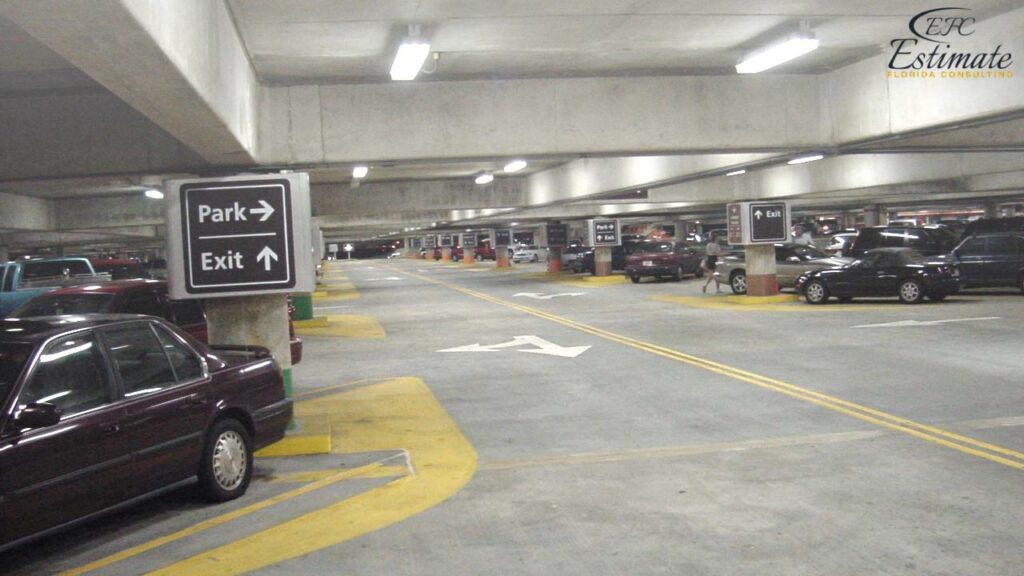
Category | Cost |
National average | $10.725 million |
Average range | $8.25 million – $13.2 million |
Low-end | $165,000 |
High-end | $22 million |
Comparing Traditional and Precast Parking Garage Costs
Today, the majority of parking garages are constructed using precast materials. These typically involve precast concrete pillars and forms, although luxury and urban garages may utilize precast brick and other decorative elements as well. Precast pillars and forms are cost-effective and streamline construction, though they require transportation to the site and heavy equipment like cranes for installation. Compared to traditional poured concrete, precast methods enable quicker construction times, potentially shortening project durations by days, weeks, or even months. Given its prevalence, the cost estimates in this guide primarily focus on precast garages.
The cost per parking space varies significantly between precast and traditional garages. With a 10% increase in costs, precast parking garages now average between $21,450 and $28,600 per space, while traditional garages range from $34,650 to $46,200 per space. A typical parking space can range from 300 to 400 square feet, with the most common size being 340 square feet.
Type | Average Price per Space (Labor Included) |
Precast | $21,450 – $28,600 |
Traditional | $34,650 – $46,200 |
Parking Lot Costs per Square Foot
Costs for parking lots are typically calculated per square foot and vary based on the type and location. Constructing a precast parking lot generally costs between $55 and $88 per square foot, with $71.50 per square foot being the most common rate. Prices can fluctuate depending on geographic location, with urban areas often commanding higher overall costs.
Size | Precast Cost (Labor Included) |
50,000 sq.ft. | $3.025M – $4.84M |
100,000 sq.ft. | $6.05M – $9.68M |
150,000 sq.ft. | $9.075M – $14.52M |
200,000 sq.ft. | $12.1M – $19.36M |
250,000 sq.ft. | $15.125M – $24.2M |
Parking Garage Cost Based on Number of Levels
The cost of constructing a parking garage varies depending on its design, whether it’s single-level, automated, or multi-level. Typically, you can expect to budget between $15,400 and $33,000 per parking space. Multi-level garages are the most common type due to their space-saving benefits—multiple levels accommodate more cars. In contrast, single-level garages have lower construction costs since they do not require foundations capable of supporting additional levels.
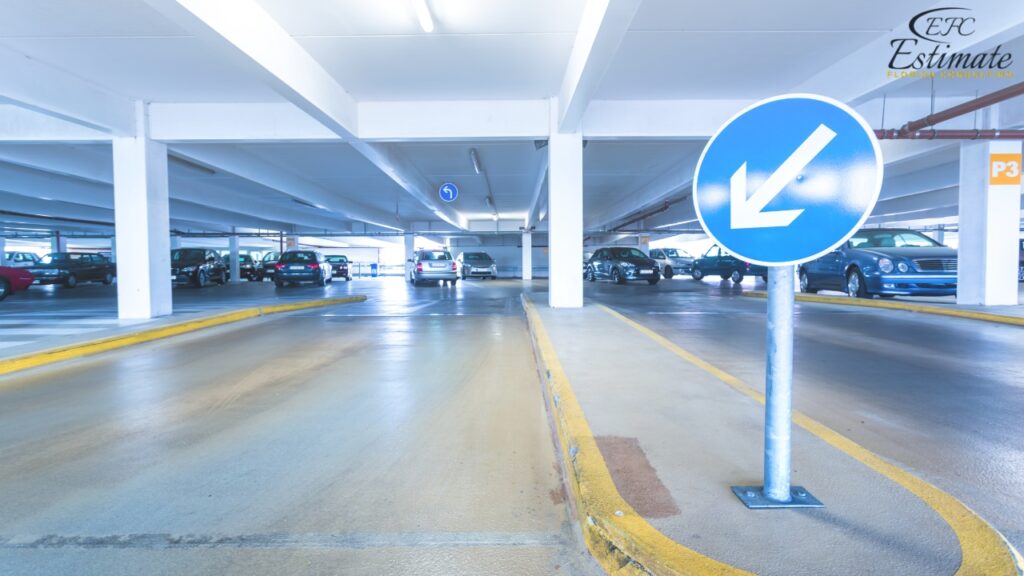
Number of Levels | Cost per Space (Labor Included) |
Single-Level | $15,400 – $22,000 |
Multi-Level | $20,900 – $33,000 |
Single-Level Parking Garage
Single-level parking garages cost between $15,400 and $22,000 per space to construct. They are less common than surface lots or multi-level garages due to their higher construction costs compared to surface lots. Despite accommodating fewer cars per area compared to multi-level structures, single-level garages do not require foundations designed to support additional levels.
Multi-Level Parking Garage
Multi-level parking garages are the most expensive to build, averaging $20,900 to $33,000 per space. Despite their higher cost, multi-level garages are the most prevalent type due to their efficiency in space utilization. These garages typically have five levels but can vary depending on specific needs. Constructing a multi-level garage involves reinforcing the foundation to support the weight of upper levels.
Parking Garage Prices by Location
The cost of constructing a parking garage varies significantly based on its location, ranging from $1,500 to $55,000 per space. Factors such as the type of city or area, urban versus suburban settings, and whether the garage is above ground, at ground level, or underground all contribute to the overall construction costs. Below is a table detailing the average prices for building a garage depending on its location:
Location | Average Price per Space |
Suburban | $1,500 – $15,000 |
Urban | $5,000 – $35,000 |
Underground | $20,000 – $55,000 |
Surface Parking
Lot Surface parking lots are often a cost-effective option for construction, especially on flat or cleared terrain. The cost to build a surface parking lot per space typically ranges from $1,650 to $11,000. If the lot requires minimal tree removal, soil compaction, or leveling, the cost can be as low as $1,650 per space. However, if extensive work such as tree cutting, pavement removal, or significant leveling is needed, costs can escalate up to $11,000 per space. On average, the cost per space for a surface parking lot is around $5,500.
Underground Parking
Garage Building an underground parking garage is considerably more expensive, with costs ranging from $27,500 to $55,000 per space. Each additional level below ground significantly increases total expenses. Going down one level typically increases costs by 20%, while two levels can double the price. Further excavation results in even higher costs. Although building underground garages beyond one or two levels is rare due to cost considerations, they can be a practical solution where space is limited and costs remain manageable.
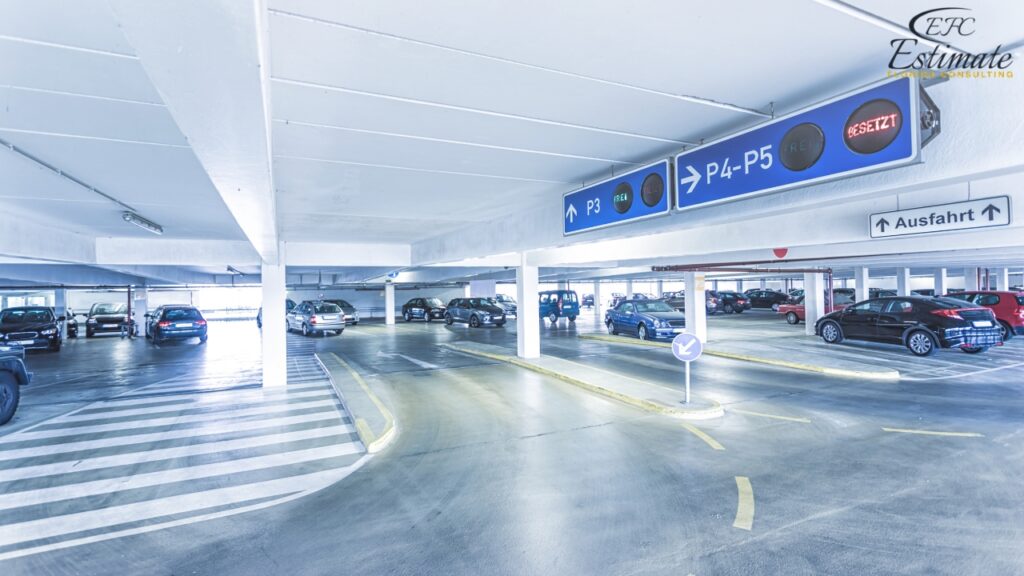
Parking Lot Costs by Material
The costs for various parking lot materials range from approximately $1.10 to $14.30 per square foot, depending on the material used. Surface lots are typically paved with asphalt, a durable and cost-effective option. However, the choice of material can significantly impact the overall cost of the lot. Here’s a breakdown of the updated costs for each material:
Material | Cost per Sq.Ft. (Labor Included) |
Chip Seal | $2.20 – $5.50 |
Permeable Pavers | $2.20 – $8.80 |
Gravel | $3.30 – $5.50 |
Concrete | $4.40 – $7.70 |
Asphalt | $7.70 – $14.30 |
Chip Seal Parking Lot
A chip seal parking lot costs between $2.20 and $5.50 per square foot to install. This method involves applying a layer of heated asphalt binder to the prepared surface, followed by a layer of aggregate chips. Chip seal lots can be colored and shaped, offering flexibility for private parking areas. They are suitable for warmer climates where the asphalt can adhere well and provide a durable surface. With regular maintenance, including sealing every few years, chip seal lots can maintain their integrity for 20 to 40 years.
Permeable Paver Parking Lot
Permeable pavers cost between $2.20 and $8.80 per square foot to install. These lots are designed with porous pavers that allow water to penetrate through to the underlying ground, promoting natural drainage and reducing runoff. Permeable pavers are eco-friendly and lightweight, making them easier to install compared to traditional pavement. They require less maintenance over time compared to asphalt or concrete, as they help mitigate stormwater issues by allowing rainwater to infiltrate the ground. This material is particularly beneficial in areas with strict stormwater management regulations.
Gravel Parking Lot
Gravel, priced at $3.30 to $5.50 per square foot, is the most economical paving material. Gravel lots consist of multiple layers, including a base for drainage and a top layer for vehicle support and aesthetics. They are highly heat-resistant and suitable for areas with warm climates. However, gravel lots require regular maintenance, such as replenishing the gravel every few years to prevent erosion and maintain a smooth surface. With proper upkeep, including grading and occasional reapplication of fresh gravel, these lots can last up to 100 years.
Get 5 New Leads Next 7Days With Our System
- Multi-Family Building
- Hotel Building
- Hospital Building
- Warehouse Building
- High-Rise Building
- Shopping Complex
Concrete Parking Lot
Concrete costs between $4.40 and $7.70 per square foot for installation. This material is durable and performs well in warm climates, where it can withstand high temperatures and heavy traffic. Concrete parking lots can be customized with colors and textures, making them suitable for private lots or areas where aesthetics are important. However, in colder climates, concrete may require more maintenance to prevent cracking and damage from freeze-thaw cycles. Regular sealing every few years can extend the lifespan of concrete lots to 20 to 40 years.
Asphalt Parking Lot
Asphalt is the most common material for parking lots, with costs ranging from $7.70 to $14.30 per square foot. It offers a balance of durability and affordability, making it suitable for various climates. Asphalt lots are darker in color, which helps them melt snow faster in colder regions. They require less maintenance compared to gravel and can withstand heavy traffic. Regular cleaning and sealing every few years can extend the lifespan of asphalt lots to 12 to 25 years. Asphalt is also versatile, as it can be colored or tinted for private parking areas, providing options for customization and enhancing visual appeal.
Parking Garage Construction Cost Breakdown
Constructing a parking garage with an average size of 150,000 square feet above ground typically costs $9.75 million. Within this total cost breakdown, labor expenses account for approximately 20.1% to 25%, totaling around $3.5 million. Material costs make up 35% to 40%, amounting to about $4.1 million. Machinery expenses constitute the remaining 10% to 15%, approximately $1.2 million. The final 10% to 30%, around $950,000, covers finishing touches and soft costs associated with the project.
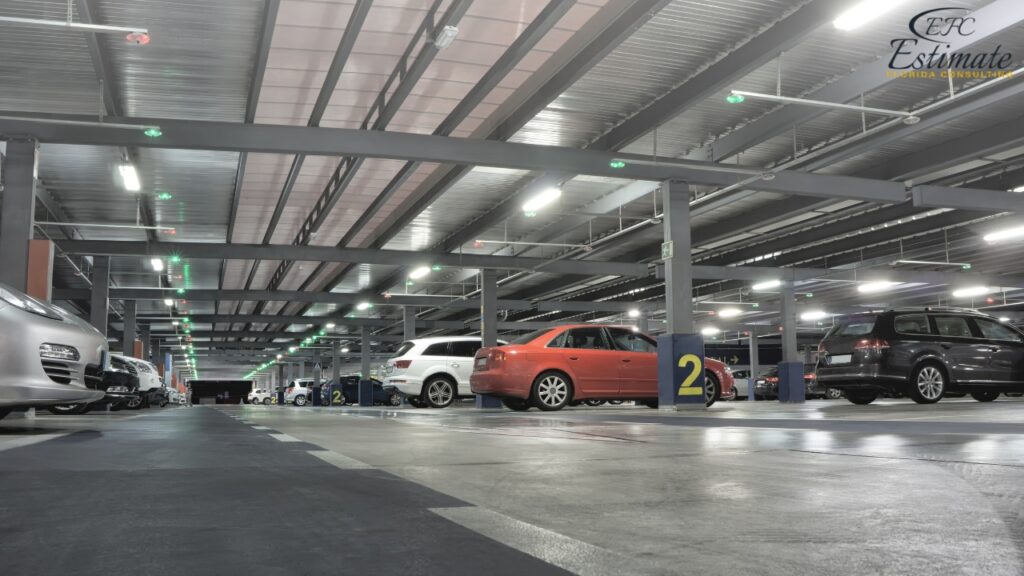
The choice of structural system and materials used significantly influences the overall cost. Options include precast forms, cast on-site concrete forms, or steel forms. Additionally, deciding between a short-span structure, which is more economical but accommodates fewer cars, versus a long-span structure, which is more costly but accommodates more cars, plays a crucial role in determining project expenses.
Part of Project | Percentage of Total Cost |
Structural Engineer Fees | 1% – 20% |
Finishing | 5% – 10% |
Soft Costs | 5% – 10% |
Architect | 8.9% – 10% |
Equipment | 10% – 15% |
General Contractor | 15% – 20% |
Labor | 20.1% – 25% |
Material | 35% – 40% |
Construction Process
Before commencing any construction, ensure all required permits are obtained. The process begins with utility companies marking buried lines to prevent damage during excavation. Next, existing surfaces are either prepared as a suitable base or replaced with new subgrade. Similar to residential construction, a compacted base is laid, followed by positioning precast columns. Subsequently, asphalt or concrete is poured and compacted using heavy vibratory rollers. Once cured, precast elements such as panels, girders, wall panels, stairs, and slabs are installed to form the skeleton for each level. These precast components are lifted and positioned using concrete lifting anchor systems. This sequence repeats for each level. Ramp and elevator systems, if included, are integrated during garage construction. Upon completing the primary structure, finishing touches commence, including marking lot lines, installing bumpers, signs, sensors, and other enhancements. Typically, construction duration ranges from 6 to 24 months, varying with garage size and complexity.
Parking Lot Striping Cost by Type of Sign
The cost of striping a parking lot has seen an increase of approximately 10% across various types of signs. Standard 4-inch lines now range from $0.22 to $0.33 per linear foot, while thicker 12-inch lines can cost up to $0.72 per linear foot. On a per square foot basis, parking lot striping costs now range from $0.22 to $1.10. This means that striping around 50 car spaces can now cost between $385 and $880. Contractors still primarily use 100% acrylic water-based traffic paint for its bright, durable markings resistant to fading under traffic. Additional markings such as directional arrows, letters, pedestrian crosswalks, stall numbers, car stops, curb paintings, or handicap logos incur extra charges, typically priced individually based on complexity. Contractors may apply a minimum fee or add 20% to 50% for initial line installation on unmarked surfaces. Under dry, sunny conditions, the painted lines generally dry within approximately 4 hours.
Type of Sign | Cost (Labor Included) |
Lines | $0.24 – $0.79/linear foot |
Curb Painting | $0.60 – $1.82/linear foot |
Stenciled Numbers | $1.82 – $4.24/number |
Letters | $2.42 – $4.84/letter |
Directional Arrows | $12.10 – $36.30/each |
Stop Signs | $18.15 – $30.25/each |
Handicapped Logos | $30.25 – $36.30/each |
Pedestrian Crosswalks | $55 – $90.75/each |
Automated Parking Garage Cost
Constructing an automated garage raises the cost per car space to approximately $17,600 to $26,400. Despite initial impressions that an automated garage, which utilizes robotic technology for parking, is more expensive than traditional counterparts, this assumption is incorrect. Automated garages require less space per car and eliminate the need for ramps and driving lanes, allowing more cars to be accommodated within the same area. Consequently, while the upfront investment per space may be higher, the overall costs can vary depending on the size of the garage.
Parking Garage Maintenance Costs
The estimated annual budget for total operating and maintenance expenses for a parking garage ranges from $484 to $726 per space. This figure varies depending on whether the facility is a surface lot or a multi-level garage. Like any building, parking garages incur regular maintenance costs, which include routine inspections, patching cracks and potholes, addressing structural issues, waterproofing, and upkeep of electrical and other utilities. To reduce maintenance costs over time, consider installing photovoltaic cells or energy-efficient lighting systems on the garage roof.
It’s crucial to perform regular preventative maintenance such as sealing decks and replacing caulking and joints to prevent more significant structural issues in the future. Utilize various forms and online checklists to assess the current condition of the garage and identify areas that require attention. If necessary, seek advice from a qualified engineer to discuss specific maintenance and repair needs for the garage.
Repaving a Parking Lot
The cost to repave a parking lot typically ranges from $1.10 to $7.70 per square foot, depending on the chosen material. Parking lots generally require periodic repaving as part of regular maintenance throughout their lifespan. Larger lots may receive a prorated price per square foot, while smaller lots might incur a higher per square foot cost. The frequency of repaving depends on factors such as the type of material used, local climate conditions, and the lot’s exposure to weather elements. Lots in mild climates or those covered by structures may require less frequent repaving compared to those exposed to harsh weather.
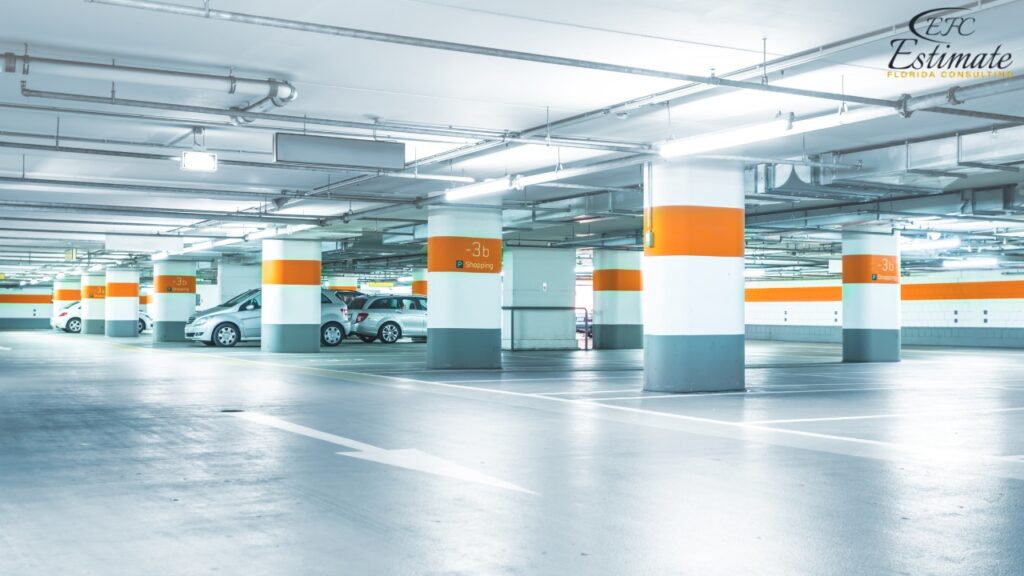
Gravel lots are the least expensive to repave but often necessitate more frequent repaving. On the other hand, concrete is the most expensive material to repave.
Enhancements and Improvement Costs
Parking Garage Elevator
Installing a parking garage elevator typically ranges from $48,400 to $78,650. Elevators are essential in multi-level garages to facilitate convenient access for visitors to and from their vehicles. Costs vary based on the elevator type, such as hydraulic or pneumatic systems. Hydraulic elevators are known for their reliability and smooth operation, utilizing a hydraulic piston to move the elevator car. Pneumatic elevators, on the other hand, use air pressure changes to move the car, offering quieter operation and space-saving benefits. Permitting, fees, and inspections are necessary components of elevator installation in garage projects, ensuring compliance with safety and operational standards.
Photovoltaic Systems
The installation of photovoltaic (PV) systems for parking garages starts at approximately $121,000 for canopy installations. PV systems harness solar energy to generate electricity, which helps offset operational costs associated with indoor lighting, elevator usage, and other electrical needs within the garage. Beyond cost savings, these systems also contribute to sustainability efforts by reducing the carbon footprint of the facility. Depending on the garage’s layout and energy consumption goals, PV configurations may include rooftop installations or canopy structures over parking spaces, providing shade to vehicles while generating renewable energy.
Parking Lot Sensors
Parking lot sensor systems cost between $24.20 and $484 per sensor, depending on the complexity and features required. These sensors play a crucial role in enhancing parking efficiency by accurately detecting vacant parking spaces in real-time. Advanced sensor technologies utilize infrared or ultrasonic sensors to detect vehicle presence and relay information to centralized management systems or smartphone apps, allowing drivers to quickly locate available parking spots. Installation of parking sensors is typically straightforward, involving surface-mounted or embedded sensor units that are calibrated for optimal performance in various weather conditions.
Parking Lot Bumpers
Parking lot bumpers, also known as curb stops or wheel stops, are priced between $27.50 and $90.20 per bumper. These devices are strategically installed along parking spaces to prevent vehicles from overshooting and damaging adjacent structures or parked cars. Made from durable materials such as rubber or concrete, bumpers are designed to withstand frequent vehicle contact and provide a visible marker for drivers. Color-coded bumpers enhance visibility, aiding drivers in parking accurately and safely within designated areas. Installation of bumpers is straightforward and can be tailored to match the aesthetics and functional requirements of the parking facility.
Parking Lot Pay Machine
Parking lot pay machines range in price from $6,050 to $24,200, depending on the features and functionalities included. These machines facilitate efficient payment processing for parking fees in both gated and non-gated parking facilities. Gated systems typically feature automated ticket dispensers or card readers, allowing for quick entry and exit based on pre-determined parking rates. Non-gated systems may employ pay-and-display ticket machines, where drivers purchase and display tickets indicating their paid parking duration. Modern pay machines may also support payment options via mobile apps or credit card terminals, enhancing convenience for users and reducing operational overhead associated with manual payment processing.
License Plate Reader
Automated License Plate Readers (ALPRs) are priced between $12,100 and $30,250, depending on their capabilities and installation requirements. These sophisticated systems use optical character recognition (OCR) technology to scan and capture license plate information swiftly and accurately. ALPRs are invaluable tools for parking management, allowing operators to monitor vehicle entry and exit, enforce parking regulations, and facilitate automated payment systems. High-quality ALPR systems feature advanced camera sensors and robust OCR software, ensuring reliable performance across various lighting and weather conditions. Installation of ALPRs involves strategic placement to maximize coverage and effectiveness in managing parking operations efficiently.
Additional Considerations and Costs
Permits: Obtaining permits is essential for constructing a parking garage. Most jurisdictions require submitting plans for city approval and adhering to local building ordinances. Permit costs vary by location and project scope, typically ranging from $1,000 to $5,500 or more.
Parking Business: Building a parking lot or garage can serve as a lucrative revenue stream. Many investors begin with one facility and expand into multiple locations, capitalizing on opportunities in office buildings, retail centers, malls, mixed-use developments, concert venues, stadiums, and other high-traffic areas.
Land Cost: The cost of land is a critical factor. If you own the land, development costs are incurred. Otherwise, purchasing or leasing sufficient land is necessary for the project’s success, with prices ranging from $15 to $30 per square foot in urban areas.
Location: The location significantly influences both construction costs and parking fees. Urban areas generally have higher construction costs but offer greater revenue potential. Areas prone to natural disasters may require additional investment in structural integrity to mitigate risks.
Parksmart Certification: Parksmart certification acknowledges sustainable and high-performing parking structures. It promotes innovative strategies in facility design, technology, management, and programs. Both new constructions and existing facilities can achieve this certification, enhancing operational efficiency and environmental sustainability.
Mechanical Ventilation: Enclosed parking garages require mechanical ventilation systems to comply with the International Mechanical Code. Costs for installing these systems vary widely based on garage size and complexity, ranging from $500,000 to $1.5 million or more.
Sprinkler Systems: Open parking garages do not require sprinkler systems as they are open to the sky. However, enclosed spaces must install sprinklers to safeguard against fire hazards. Installation costs typically range from $1.10 to $3.30 per square foot of the sprinkler system.
Download Template For Parking Garage Project Breakdown
- Materials list updated to the zip code
- Fast delivery
- Data base of general contractors and sub-contractors
- Local estimators

Conclusion
The cost of building a parking garage varies widely based on several factors such as size, location, materials, and design complexity. The national average cost falls between $8.25 million and $13.2 million, with a typical expense of approximately $10.725 million for a 150,000 square foot multi-level garage above ground. The choice between traditional poured concrete and precast materials significantly impacts costs and construction timelines. While precast methods generally offer savings and faster completion, traditional methods can be more expensive due to longer construction times. Additionally, factors like the number of levels and location (urban vs. suburban) further influence total expenses. Ultimately, understanding these variables is crucial for stakeholders planning parking infrastructure projects to ensure cost-effective and efficient construction tailored to specific needs and budgets.
FAQs
The national average cost to construct a parking garage typically ranges from $8.25 million to $13.2 million. On average, people pay around $10.725 million for a 150,000 square foot multi-level parking garage above ground.
Precast parking garages are generally more cost-effective compared to traditional poured concrete garages. The cost per parking space for precast garages ranges from $21,450 to $28,600, whereas traditional garages range from $34,650 to $46,200 per space.
The cost of constructing a precast parking lot typically ranges from $55 to $88 per square foot, with the average rate being $71.50 per square foot. Costs can fluctuate based on geographic location, with urban areas usually commanding higher prices.
Single-level parking garages cost between $15,400 and $22,000 per space, while multi-level garages range from $20,900 to $33,000 per space. Multi-level garages are more expensive due to their space-saving benefits and structural requirements.
Construction costs for parking garages vary significantly by location:
- Suburban areas range from $1,500 to $15,000 per space.
- Urban areas range from $5,000 to $35,000 per space.
- Underground garages range from $20,000 to $55,000 per space.
Surface parking lots cost between $1,650 and $11,000 per space to build, depending on factors like terrain preparation and site conditions.
Building an underground parking garage costs between $27,500 and $55,000 per space, with costs increasing significantly for each additional level below ground.
Costs vary widely by material:
- Asphalt costs $7.70 to $14.30 per square foot.
- Concrete costs $4.40 to $7.70 per square foot.
- Gravel costs $3.30 to $5.50 per square foot.
- Chip seal costs $2.20 to $5.50 per square foot.
- Permeable pavers cost $2.20 to $8.80 per square foot.
For a typical 150,000 square foot parking garage above ground:
- Labor costs account for 20.1% to 25%.
- Material costs make up 35% to 40%.
- Machinery expenses constitute 10% to 15%.
- Finishing touches and soft costs amount to 10% to 30%.
Additional costs may include permits ($1,000 to $5,500+), land acquisition ($15 to $30 per square foot), and installation of amenities like elevators ($48,400 to $78,650) or photovoltaic systems ($121,000+).
Google Reviews



Process To Get Parking Garage Cost Estimate Report
Here I am going to share some steps to get your parking garage cost estimate report.
-
You need to send your plan to us.
You can send us your plan on info@estimatorflorida.com
-
You receive a quote for your project.
Before starting your project, we send you a quote for your service. That quote will have detailed information about your project. Here you will get information about the size, difficulty, complexity and bid date when determining pricing.
-
Get Estimate Report
Our team will takeoff and estimate your project. When we deliver you’ll receive a PDF and an Excel file of your estimate. We can also offer construction lead generation services for the jobs you’d like to pursue further.

